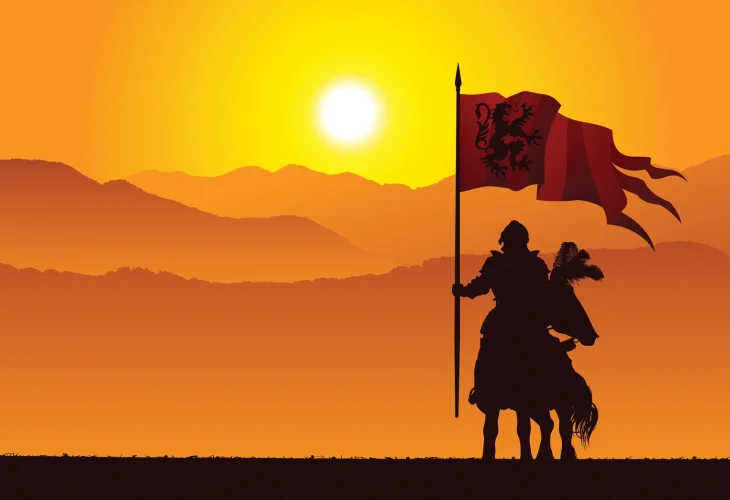The Crusaders: A Victory Lost to a Critical Mistake
The Crusaders were formidable warriors, but their failure to settle the land turned victory into defeat. When a nation rules but doesn't settle, it struggles to maintain control and can be easily ousted.
 (Illustration: shutterstock)
(Illustration: shutterstock)In the 10th century CE, nearly a millennium ago, Europe was swept by bands of Crusaders aiming to capture the Holy Land from the non-believing Muslims. They were joined by Vikings from the north, heroic wanderers whose culture included raids on distant lands. They arrived in Israel clad in iron armor, their horses similarly outfitted, wielding enormous swords that demanded significant strength to manage. They subdued the Muslims, created knightly orders living in the fortresses they built along main roads, with these knights defending their rule in the land. At the forefront of these campaigns stood renowned heroes, with the first Crusade led by the knight Godfrey of Bouillon, who passed through the city of Rashi the Sage in Worms, and even met him.
Tragically, on their way to the Holy Land, the Crusaders massacred Jews. Upon reaching Israel, they fought the Fatimid caliphs who then ruled it, towards the end of the Muslim period. Many of the Crusaders were French, known in the Middle East as "Franks". They advanced from the north. Throughout the route from Beirut to Caesarea, there was no resistance. Arab peasants and others fled before them. They knew the challenge would be capturing Jerusalem, a fortified city and Muslim stronghold. From Caesarea, the Crusaders turned to Jerusalem. Here too, the inhabitants of Ramla and Jaffa fled, and the main battle was over Jerusalem itself. The Crusaders succeeded, breached the walls, looted the city, and sold the Muslim inhabitants as slaves. Battles continued for decades over various cities in the land, with Muslims repeatedly fortifying themselves in different cities, and the Crusaders besieging them. It seems the Crusaders simply relished sieges and wars. They constructed more and more fortresses along the roads, with new Crusades every few decades bringing more knights from Europe seeking adventures in the Middle East.
The Crusaders were great heroes, but they essentially did not settle the land, and this was their mistake. When a people rule a land but don’t inhabit it, they constantly battle the residents and are easily expelled. Despite their grand presence, there were only about twenty thousand Crusaders in the entire country, all soldiers. The cities emptied due to the fleeing Muslims, turning them into desolate places, leaving only the Crusader fortresses thriving. Their fortresses were indeed immense, with many surviving almost intact. Some became national parks, such as Montfort Castle in Nahal Kziv or Apollonia Castle in Herzliya. The fortress in Atlit is now a naval base, as are many others. But fortresses alone do not make a state.
The Crusaders also rehabilitated the ports and port cities, particularly Caesarea. However, ports thrive on goods, and they had no agricultural products, only the goods of local inhabitants and Muslims. Thus, while the Crusader knights celebrated their absolute rule in the land, those who remembered the land's former state wrung their hands in sorrow. The spiritual leader of the time, the Ramban, who came from Spain to Israel due to a debate with Christianity, describes the land then: "Desolate is its expanse, and abandoned, all that is more sacred than its counterpart is more ruined. Jerusalem is more ruined than all the land, and the Judaean land more than the Galilee."
The Russian monk Daniel, in his letters from the journey to Jerusalem, writes: "Jerusalem seems to me like a desolate city, the streets empty and the ground seemingly cursed."
Rabbi Benjamin of Tudela, a 12th-century Jewish traveler, wrote in his travels: "In my journeys across the land, I found abandoned villages, empty houses, and only ruins as testimony to the settlements that once existed here."
The Crusaders' failure has a natural explanation, as we've seen, but this conduct was deemed by the Creator. He allowed them to harm Jews and even step foot on the Holy Land but never to take it for themselves, to settle there as a people among peoples – this he did not and will never allow. The Holy Land is destined for Israel, and all other nations – their feet may wander here. They can stay for a generation, two generations, maybe even three, but settle? Never.
After over two hundred years of Crusader rule, their kingdom crumbled. The Mamluks replaced them, about whom we'll tell in the next chapter.

